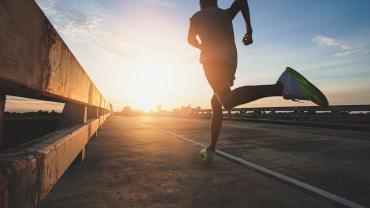
The majority of athletes across various experience levels begin a workout in a state of hypohydration – defined as a water deficit caused by acute or chronic dehydration. Moreover, these athletes tend to replenish only two-thirds of the sweat loss based on thirst or fluid intake. Mild-to-moderate hypohydration (up to a 2% loss of body mass due to water deficit) can diminish athletic performance, exercise recovery, cognitive function, reaction time, and motor coordination; and severe hypohydration (more than a 5% loss of body mass) can compromise vital organ function.
In addition to starting a workout in a state of hypohydration, athletes can further lose excessive fluid and electrolytes through sweating when performing physical activity, particularly in warm/hot environments. Thus, water alone does not replenish the fluids lost from sweat; electrolytes are also needed.
Key electrolytes that promote fluid balance are sodium, potassium, chloride, magnesium, phosphate, and bicarbonate, which can come from foods, fluids, or supplements. Proper electrolyte balance promotes hydration and athletic performance and supports muscle function, bone health, cardiovascular health, energy production, and cognitive and neurological health. Furthermore, adding electrolytes to water for rehydration can help support proper blood glucose and carbohydrate metabolism.
Brief exercises (5 to 10 minutes) at moderate to high intensity will result in minor water and electrolyte losses from sweating. Endurance exercises (30 minutes to 5 hours) result in moderate-to-large losses, whereas ultra-endurance exercises (5 to 24 hours) result in water and electrolyte losses that exceed the typical 24-hour dietary intake.
Dehydration during exercise increases thermal strain, impacting cardiovascular function and heat tolerance. Dehydration is also associated with increased exhaustion after exercise and the onset of exercise-associated muscle cramps. Euhydration (optimal total body water content) promotes optimal bodily functioning, including cardiovascular health, thermoregulation, and athletic performance.
The overarching guidance to maintain euhydration during and after exercising is replenishing all fluids and electrolytes lost due to sweating. According to the National Athletic Trainers’ Association Position Statement, athletic trainers should promote euhydration (+1% to –1% compared with baseline values) before exercising and a body mass loss of less than 2% at the end of the exercise, which can be supported by consuming electrolyte-water beverages.
A double-blind, randomized crossover study with 18 elite academy soccer players showed that the athletes who ingested a 12% carbohydrate-electrolyte beverage before each half of a soccer match simulation helped to retain ball passing performance and improved high-intensity running capacity. However, one problem with typical carbohydrate-rich commercial drinks is that some individuals may experience gastrointestinal upset before or during an activity. Consequently, individuals may opt to have plain water with electrolytes added (in powder form) during their training or competition season.
Athletes with higher-than-average sweat sodium concentrations (greater than 60 mEg/L) and high sweat rates (greater than 2.5 L/h) may benefit from sodium in fluids during exercise. Post-exercise, replacing fluids and electrolytes lost from sweating (or up to 150% fluids lost) within two hours is crucial for promoting euhydration, athletic performance recovery, and decreasing post-exercise fatigue.
Armstrong offers nine recommendations or guidelines for endurance athletes to help maintain euhydration and electrolyte balance:
Maintaining optimal electrolyte balance is crucial for high-intensity and endurance athletes to maintain euhydration. Incorporating electrolyte-water beverages before, during, and after exercising can offer clinical benefits, contributing to overall health and promoting peak athletic performance and exercise recovery.
By Danielle Moyer Male, MS, CNS, LDN